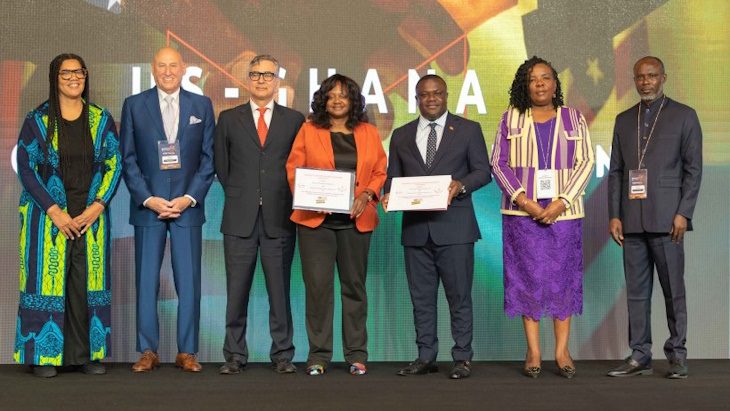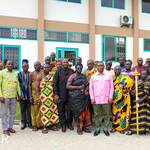Ghana has signed an agreement with a U.S. developer for a nuclear reactor using technology from NuScale Power, the U.S. State Department announced.
This agreement is part of Ghana’s efforts to build its first atomic power plant.
Nuclear Power Ghana (NPG) and Regnum Technology Group signed the agreement to deploy a single NuScale VOYGR-12 small modular reactor (SMR) plant during the second annual US-Africa Nuclear Energy Summit.
A new approach to nuclear power
SMRs are smaller than traditional reactors and can be built in a factory.
However, there are still questions about whether they will become commercially widespread. NuScale is currently the only company licensed to build a U.S. SMR.
The U.S. is promoting these technologies as clean energy solutions, aiming to sell them to developing countries.
Regnum is a U.S. nuclear technology project developer partnered with private entities, including NuScale.
NPG was established in 2018 to be the owner and operator of Ghana’s first nuclear power plant.
U.S.-Ghana civil nuclear cooperation
This commercial agreement between NPG and Regnum represents a significant advancement in collaboration between the U.S. and Ghanaian civil nuclear industries and demonstrates the commitment of both nations to advancing clean and sustainable energy solutions.
The SMR project is expected to be a cornerstone of Ghana’s efforts to enhance its energy infrastructure and lead the way in SMR deployments in the region.
This initiative will help Ghana achieve its energy goals, reduce greenhouse gas emissions, and set a precedent for future energy projects in the region.
Building on existing cooperation
The agreement builds on existing U.S.-Ghana civil nuclear cooperation, including cooperation under the U.S. Foundational Infrastructure for the Responsible Use of Small Modular Reactor Technology (FIRST) Programme.
This programme is helping Ghana establish itself as an SMR Regional Hub and center of excellence.
In addition to technical training, advisory services, and study tours, the FIRST Programme is providing a NuScale Energy Exploration (E2) Center SMR control room simulator to serve as a regional training center for nuclear power technicians and operators.
It is also establishing a welding certification program to support job creation and supply chain development in the region.
Through this dedicated workforce development focus, Ghana will be positioned to establish a skilled nuclear workforce consistent with the highest international standards of nuclear safety, security, and nonproliferation.
A unique SMR design
NuScale’s VOYGR module is a pressurized water reactor with all the components for steam generation and heat exchange incorporated into a single unit.
A 50 MWe version of the module is the first—and so far the only—SMR design to receive approval from the U.S. Nuclear Regulatory Commission.
The company is seeking regulatory approval for a 77 MWe version.
A project to build the first NuScale SMR units at a site near Idaho Falls in the USA had been planned for operation by 2029 but was canceled in late 2023.
U.S. support and global collaboration
According to the U.S. Department of Energy, which has provided more than $579 million since 2014 to support the design and licensing of the VOYGR SMR, the two companies plan to form a subsidiary company to own and operate Africa’s first commercial advanced light-water SMR power plant.
However, the company is working with governments and organizations worldwide to bring its technology to the global market.
Ghana’s commitment to nuclear energy
During the signing at the U.S.-Africa Nuclear Energy Summit in Nairobi, a Deputy Minister of Energy, Mr. Collins Adomako-Mensah, affirmed Ghana’s commitment to adding nuclear power to the country’s energy mix.
He said Ghana recognized the importance of nuclear energy for economic and social development.
A milestone in Ghana’s nuclear agenda
The commercial agreement between NPG and Regnum marks a significant step forward toward cooperation between the United States and Ghana’s civil nuclear industries.
It demonstrates both countries’ commitment to advancing clean and sustainable energy solutions.
The SMR project is anticipated to be a cornerstone of Ghana’s efforts to enhance its energy infrastructure and lead the way in SMR deployments in the region.
Mr. Adomako-Mensah described the development as a significant milestone in Ghana’s nuclear agenda.
“This agreement aligns with Ghana’s aim to establish itself as a small modular reactor (SMR) regional training hub and center of excellence for sub-Saharan Africa, supporting the West African power pool and promoting clean, reliable energy,” he said.
Nuclear energy adoption
Ghana’s Energy Transition Framework intends to achieve Net Zero by 2060 by deploying low-carbon technologies across all sectors.
The adoption of nuclear energy is expected to help Ghana achieve the target by reducing the nation’s reliance on fossil fuels, mitigating climate change, and ensuring energy security for future generations.
South Africa is the only African country currently generating electricity from a nuclear power plant. Egypt is also setting up plants with a capacity of 4,400 megawatt energy (MWe).
Partnering with Africa on nuclear energy
Nana Menya Ayensu, Special Assistant to the President for Climate Policy, Finance, and Innovation at the White House Climate Policy Office, expressed confidence in Africa’s capability to embrace nuclear energy.
He said that nuclear energy was more than just developing power plants; it was about building a robust nuclear industry that creates jobs, fosters local supply chains, and boosts economic development.
Mr. Ayensu reaffirmed the U.S.’ commitment to partnering with Africa on its nuclear journey, emphasizing the shared goal of sustainable and inclusive development.
Dr. Michael Goff, Acting Assistant Secretary, Office of Nuclear Energy, U.S. Department of Energy, noted that Africa was prepared for nuclear energy, which was consistent with growing recognition of nuclear power’s role in economic growth and energy security.
In the United States, nuclear energy is a vital source of clean, base-load electricity, accounting for more than 20 percent of total electricity generation and almost 50 percent of clean energy.
Dr. Goff said the U.S. was committed to expanding nuclear energy, aiming to triple its capacity by 2050.
“Key initiatives include preserving the current nuclear fleet, deploying new reactors, and securing the nuclear fuel supply chain,” he added.
U.S. and IAEA support for nuclear energy in Africa
U.S. Under Secretary for Arms Control and International Security, Bonnie Jenkins, observed the signing ceremony.
“Signing this agreement will position Ghana as a leader in the deployment of small modular reactors in Africa, catalyzing economic development and job creation in the region,” she said. “We are excited by the promise of these technologies in building a more sustainable future.”
Prof. Shaukat Abdulrazak, Director for the Division of Africa at the International Atomic Energy Agency, welcomed the growing interest among African nations in nuclear power, adding that it had the potential to expand energy access and support economic transformation.
He assured the IAEA’s commitment to supporting member states in the safe and sustainable use of nuclear energy through capacity building, technical support, and the implementation of the Milestone approach.
U.S. support for African nuclear energy ambitions
U.S. Deputy Assistant Secretary for International Cooperation, Aleshia Duncan, highlighted that Ghana and many other African countries are pursuing nuclear energy to achieve their economic development, energy security, and decarbonization goals.
“It’s imperative that the United States remain a strong and engaged partner, offering technical expertise and resources to ensure the successful deployment of nuclear energy across the continent,” Duncan added.
The United States is committed to supporting the use of innovative clean nuclear energy to power global decarbonization efforts and provide energy security to partners worldwide.
Global Competition for Ghana’s Nuclear Plant Contract
Other major players vying for the contract to build Ghana’s nuclear plant included France’s EDF, the China National Nuclear Corporation, South Korea’s Kepco, alongside its subsidiary Korea Hydro Nuclear Power Corporation, and Russia’s ROSATOM, according to an energy ministry official in May.
- Wednesday, May 7, 2025 Newspaper Headlines - 7 May 2025
- Bawumia urges unity, end to politicisation of Bawku conflict - 7 May 2025
- CJ’s saga: Supreme Court delivers 5:0 and 3–2 decisions - 7 May 2025




